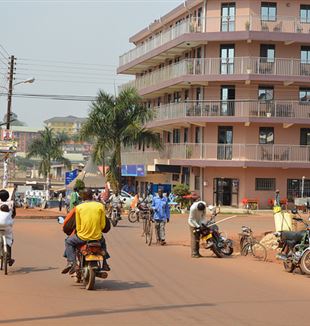
Journey to Gulu New Signs for Hope
Hunger and disease, guerilla warfare and homelessness do not have the final say in a community marked by the clear intervention of Providence.It is Saturday afternoon and Fr. Tiboni and I are traveling to Gulu to attend a Lent Retreat organized by the Gulu CL community. Brother Elio Croce, who looks so serious that you might think he never smiles, is our driver. We are already one-and-a-half hours late. This is worrying because the last quarter of our journey is dangerous, more so in the evenings as one can be attacked by the LRA rebels. Indeed, when we were less than 5 miles from Gulu, we found a truck full of food burning.
“Let’s say the rosary,” Croce–sensing the freezing silence of fear in the car–intercepts. The LRA rebels had attacked the truck that very hour. Brother Elio, as he is known in Gulu, is the Brother who risked his life by transporting the Ebola victims during the deadly outbreak in Gulu in 2001. The Ebola fever had affected 428 people, of which 178 had died. He later recounted, “It was hard at the beginning to overcome the fear of the virus, but with examples set by Dr. Matthew Lukwiya and nurse Grace Akullu, we began to work. We realized that we are here for Jesus Christ and that what we do, we do for Him.”
A Home for the Victims
“Nurse, what side do you want him to lie on?” asked Brother Croce. Croce is talking about a man, John Opio, who was bleeding profusely. Opio had been knocked on the head by a speeding mini bus, just a few miles from the burning truck that we had earlier found. Outside the ward, a smiling moon promises a full glow in a few weeks time. However, today it is peach dark, as only African nights can be. Although the evening is peaceful and the Ebola virus is gone, new troubles have visited Lacor Hospital. Since July 2002, when the LRA rebels crossed back into Uganda after the Ugandan army launched an offensive against them in southern Sudan, the number of displaced persons camps have increased from 34 to 53. This means that more than half of the population, who are in these camps, are unable to grow crops. As a result, northern Uganda is now having the worst humanitarian crisis ever.
Those who did not go to the camps sleep in the bushes or go to town centers where they sleep on shop verandas, at bus stations, or in hospitals like Lacor. More than 10,000 of these homeless were coming to spend the night in Lacor. Even today, as we enter the gates of Lacor Hospital, we enter together with groups of people, young children and families, who have come to spend the night. “They are still coming to sleep in the hospital–about 2,600,” comments Brother Croce. The majority, however, are children. In this unstable and difficult situation, there is hope. Just last October, John Paul II declared two Acholi catechists, Daudi Okello and Jildo Irwa, martyrs in Rome.
The Ebola outbreak also left its own martyrs. Doctors and nurses offered themselves for the service of others–even with the possibility of death, for Ebola mortality strikes 70% of the people it infects.
Something great is happening
“We have started two new Schools of Community, in Gulu University and Lacor Nursing School,” said Maurizio. “These are the new seeds,” he added.
It is early Sunday morning and we were going to pick the children from St Jude-an orphanage being run by Croce for the retreat. Br Croce had left before us, to pick students from Gulu University. Perhaps the most important question was that asked by Veronica: “Is it possible for a sick person to be happy? For a sick person could only bear the sickness and hope for happiness in heaven.” (Veronica is lame because she suffered from Polio from an early age).
Such are the questions that face the community of Gulu that, for the past 17 years, have experienced guerrilla warfare, the Ebola disease, famine, and martyrdom! Fr. Tiboni concluded the Retreat: “Christ affirmed his victory over evil on the cross–his victory is that goodness and truth is affirmed.” This was what Pope John Paul II told us: “Evil does not have the final word.”
During the break, we sang O Freedom, met new friends, and started to look forward to the time of the fraternity Exercises when we will meet again. With this spirit, Fr Tiboni and I left Gulu, knowing that something great is happening there.